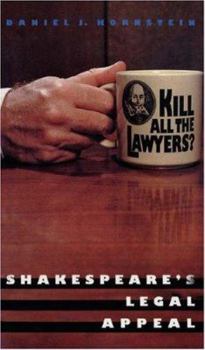Kill All the Lawyers? Shakespeare's Legal Appeal
Select Format
Select Condition 
Book Overview
How many lawyers does it take to screw in a light bulb? Depends; how many can you afford? The popular image of lawyers is taking a beating. Ironically, at a time when more people than ever hire lawyers, few want to defend them. Daniel Kornstein, a practicing attorney, finds in Shakespeare's drama the way toward a new respect for the profession and its place in contemporary society. It is no wonder that lawyers and judges quote the Bard more than any other single source. Two-thirds of Shakespeare's plays have trial scenes; many deal specifically with points of law and lawyers. The Elizabethan age seems as litigious as our own. Inspired by numerous performances of Shakespeare, Kornstein considers how legal themes relate to contemporary issues. Of Measure for Measure Kornstein points out, "Then, as now, we have thought about how much public support and respect law needs, whether or not to enforce dead letter statutes, and if it is better to interpret laws strictly or equitably. Then, as now, all of us have considered the effect of power on human nature, how judges may be corrupt, and how important mercy is." By discussing the plays in light of contemporary legal cases, Kornstein provokes thought about how law and civil justice are woven into modern society, just as they are on Shakespeare's stage. In Shakespeare, as in no other playwright, law, civil society, and humanity unite with dramatic and rhetorical brilliance. Kornstein shows how our reacquaintance with the master playwright may kindle our enthusiasm for law in our age. His objective, as a lawyer and playgoer, is to make the connections between law and literature, between the challenges of daily legal practice and the pleasures of art.
Format:Hardcover
Language:English
ISBN:0691032173
ISBN13:9780691032177
Release Date:June 1994
Publisher:Princeton University Press
Length:296 Pages
Weight:1.40 lbs.
Dimensions:9.8" x 1.0" x 6.5"
Customer Reviews
2 ratings
The Wrong Lawyer
Published by Thriftbooks.com User , 25 years ago
This is an exceptional book that should be read by any serious student of Shakespeare. It provides an insightful look at Shakespeare's legal knowledge and insightful looks at how Shakespeare saw the larger issues of truth, justice, law and equity in the dramas. His analysis of the Merchant of Venice is especially pithy and noteworthy.The major fault of the book is Kornstein has the wrong man as the author. His attempts to explain how the man from Stratford acquired this deep, profound and technial legal knowledge are woefully inadequate. Kill All The Lawyers? maintains that the man from Stratford acquired his knowledge by hanging around the Courts of Law and in "Legal London" is woefully inadequate. I suppose by the same token, the author acquired his legal knowledge by hanging out in coffee shops in Harvard Square.Kornstein is aware that the legal knowledge of Shakespeare have been a long running dispute since the beginning of the Century. The case that Edward de Vere, 17th Earl of Oxford was a lawyer, sat in Parliament, sat as a juror in the trial of Mary Queen of Scots and sat as a judge in other civil matters is ignored by the Author as he seeks to avoid the entire Oxford vs. Shakspere contretemps.With this caveat aside, it is a book well worth reading.Paul Streitz Member Shakespeare Oxford Society
Kornstein's approach is original and relevant.
Published by Thriftbooks.com User , 28 years ago
Though perhaps defensive about his title and possibly a little hard on Portia, Kornstein, in true attorney style, effectively demonstrates Shakespeare's interest in and knowledge of legal problems that still are of concern today. He makes the reader aware of Shakespeare's multi-faceted view of human nature--a characteristic easily overlooked in a superficial encounter. Weakest is his theory concerning Midsummer Night's Dream, strongest is his concluding chapter with its brilliant appreciation of Shakespeare. This is an author worth knowing, a book worth reading. --Margaret Demores






